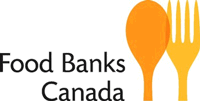23% of Canadians Report Eating "Less than They Should" Due to Rising Inflation
61% Believe the Cost of Housing is Now the Biggest Contributor to Food Insecurity in Canada
Take Action at www.foodbankscanada.ca
TORONTO, June 6, 2022 /CNW/ - More Canadians report they are facing hunger and food insecurity due to rising inflation and housing costs, according to newly released data from Food Banks Canada.
The nation's leading charitable organization that's focused on relieving hunger today and preventing hunger tomorrow, Food Banks Canada's data shows that one-in-five (an estimated 7 million) Canadians now report going hungry — with 23% reporting that they are eating less "than they think they should" because there isn't enough money for food.
"This summer will be the toughest Canada's food banks have ever experienced in our 41 year history," explains Food Banks Canada's newly-appointed CEO Kirstin Beardsley, "The majority of food banks in every region of Canada are already stretched to their limits, with demand expected to remain high throughout the summer months as more and more Canadians struggle to cope with rising inflation," says Beardsley. According to Beardsley, 61% of Canadians now believe that rising housing costs are the biggest barrier that is preventing Canadians from being able to afford food, a sentiment that has doubled in the past year alone.
- 1-in-5 Canadians (7 million people) report going hungry at least once between March 2020 - March 20221
- 1-in-3 Canadians who earn less than 50,000 a year; report instances of not having enough money for food between March 2020 – March 20221
- 43% of Indigenous individuals
- 23% report eating less than they believe they should because there wasn't enough money for food1
- 40% for those earning under $50,000 a year
- 45% for Indigenous households
- 43% for Black households
- 61% of Canadians see the "cost of housing" to be the largest financial obstacle preventing Canadians from being able to afford food; a number that has almost doubled (46%) in the past year alone2
Typically, food banks across Canada see an easing of demand during the summer months, but according to Beardsley, food bankers on the frontlines are reporting no signs of slow-downs.
"Food banks in most regions of Canada are experiencing an influx of Canadians visiting food banks for the first time — a number that's increased by up to 25% in some regions, which we haven't seen since the first few months of the pandemic," explains Beardsley, adding that food banks are also reporting that they are seeing former food bank clients forced to return, after 5 or more years of not having to rely on food banks to get by.
"The biggest sign that inflation is seriously impacting hunger and food insecurity in Canada, is that the reasons why people say they are coming to food banks is changing," says Beardsley. "In the past, people would turn to food banks during times of job loss, or due to lower wages — but over the past six months, Canadians are telling us that they are running out of money for food because of rising housing, gas, energy and food costs. That's an indication that we need to find new longer-term solutions to fight hunger and food insecurity."
"Canada's outdated social reforms are failing to keep pace with the new pressures of inflation and dramatically rising housing costs that are affecting every region of the country. Food Banks Canada research shows that Canadians believe hunger and food insecurity is unacceptable in Canada. It's time to tackle hunger at its root causes by improving access to affordable housing and piloting innovative, long-term income supports," says Beardsley, adding that Food Banks Canada encourages concerned Canadians to support their local food banks who are stretched to the limit.
In collaboration with a supportive food bank network that spans coast-to-coast-to-coast, Food Banks Canada provides national leadership to relieve hunger today and prevent hunger tomorrow. As a national charitable organization, Food Banks Canada is dedicated to helping Canadians living with food insecurity by supporting a network of Provincial Association; affiliate food banks and food agencies that work at the community level to relieve hunger. Our work is focused on maximizing collective impact, strengthening local capacity, and reducing the demand for food banks until a day when they are no longer needed. In March 2021, there were more than 1.3 million visits to Canada's food banks, a 20.3% increase compared to March 2019. Learn more about how Food Banks Canada is working to end hunger in Canada, and how you can help by accessing Food Banks Canada HungerCount 2021 Report. Join with us @FoodBanksCanada
1. |
Mainstreet Research Poll |
Automated telephone interviews (Smart IVR) survey of 4009 adults from February 25th to March 2, 2022. (March 2022) |
|
2. |
Grassroots Greenhouse Public Opinion Poll |
Online survey from representative panel of 1,007 Canadians on March 25-31, 2022 |
SOURCE Food Banks Canada

Michelle Book, Director of communications, [email protected], 647-882-6466

Share this article